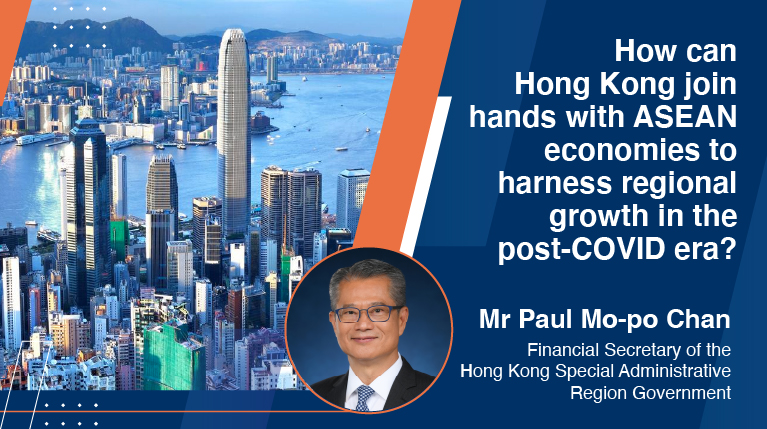|
|
|

|
|
|
| |
|
Wednesday
29
March 2023
|
|

|
|
|
|
|
Time:
|
|
5:15 pm to 6:15 pm
|
|
|
|
|
Venue:
|
|
Seminar Room 3-1, Manasseh Meyer Building, Lee Kuan Yew School of Public Policy, National University of Singapore, 469C Bukit Timah Road S(259772) |
|
|
|
|
Dress Code:
|
|
Smart Casual
|
|
|
|
|
The global economy’s continuing shift to the East is clearly reflected in the growing significance of ASEAN and its 10 Member States. Blessed with abundant natural wealth, a fast-emerging middle class and a youthful population of some 660 million people, ASEAN is an economic powerhouse – the fifth-largest economy in the world. And, since the regional trade bloc’s beginnings in 1967, founding member Singapore has played a central role in its rising prosperity and influence.
As a major international financial, business and trade centre, Hong Kong enjoys the singular advantage of being governed under the “one country, two systems” principle. It gives the economy unparalleled, and ever-deepening, connectivity with Mainland China, the world’s second-largest economy and ASEAN’s largest trading partner.
With the ASEAN-Hong Kong Free Trade Agreement and Investment Agreement in effect for more than two years now, what strategies should Hong Kong and ASEAN pursue to accelerate regional growth and integration, particularly with the global economy fast recovering in the wake of COVID-19? How can Hong Kong help drive regional development? What, in particular, can it offer the 10 Member States of ASEAN?
|
|
|
|
|
|
|
|
|
|
|
Mr Paul Mo-po CHAN
Mr Paul Mo-po Chan has been serving as the Financial Secretary of the Hong Kong Special Administrative Region Government since 2017. He was the Secretary for Development from July 2012 to January 2017. Before joining the Government, he held a number of public service positions, including member of the Legislative Council and Chairman of Legal Aid Services Council.
As the Financial Secretary, Mr Chan oversees policy formulation and implementation of financial, monetary, economic, trade, development, housing, transport, logistics, innovation and technology as well as industrial matters. He exercises control over the Exchange Fund, and is in charge of the annual Government Budget.
Mr Chan is a Certified Public Accountant. He is a former President of the Hong Kong Institute of Certified Public Accountants.
|
|
|
|
|
Prof Bernard Yeung (Moderator)
Professor Bernard Yeung is the Stephen Riady Distinguished Professor in Finance and Strategic Management at the National University of Singapore Business School. He is also the President of the Asian Bureau of Finance and Economic Research. He was Dean of NUS Business School from June 2008 to June 2019. Before joining NUS, he was the Abraham Krasnoff Professor in Global Business, Economics, and Management at New York University (NYU) Stern School of Business and the Director of the NYU China House. From 1988 to 1999, he taught at the University of Michigan and at the University of Alberta from 1983 to 1988.
Professor Yeung has published widely cited work in top-tier academic journals covering Finance, Economics, Strategy, and International Business topics. He has more than 30,000 citations.
He was awarded the Public Administration Silver Medal (2018) in Singapore, Irwin Outstanding Educator Award (2013) from the Academy of Management, and is an elected Fellow of the Academy of International Business.
|
|
|
|
|
Nicholas Zeng (Emcee)
Nicholas Zeng graduated with a Double Master Degree in Public Policy and Business MPP-MBA (MPP-MBA) in 2020. He has since served in the field of education, as Subject Head for Student Leadership and as a member of the Literature faculty of School of the Arts, Singapore.
He taught English, Literature and General Paper at Secondary and Junior College levels. He also had the opportunity to work on Character and Citizenship Education at the Ministry of Education, Singapore, and serve as a teacher-in-charge of a Students’ Council. He believes that an analytical and curious mind, an open and generous heart, and a courageous and resilient spirit, are what every student should develop in the course of their education, and seeks to do all he can to support and facilitate this.
|
|
|
|
|
|
|
|
|
|